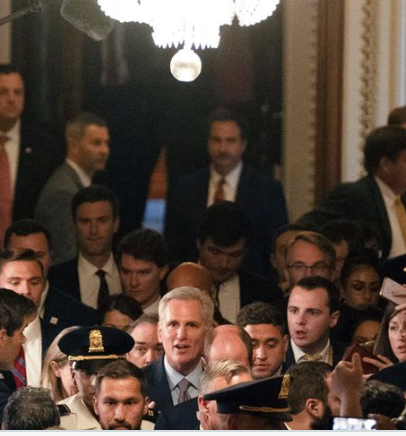A political earthquake happened Tuesday night.
The fallout from Saturday’s unsatisfying status quo budget deal came swiftly as the House voted to oust the speaker in the middle of a term for the first time in U.S. history.
Speaker Kevin McCarthy, R-Calif., was deposed by eight Republicans who voted with Democrats to remove him. The vote was 216-210. My colleague, Virginia Allen, wrote an excellent wrap-up of how the ouster went down and who was involved.
The question on everyone’s mind is: what’s going to happen now?
This is a chaotic and unprecedented situation, so it isn’t exactly clear when there will be a new speaker or who that will be.
This ousting, using the motion to vacate the chair, was only possible because of the negotiations between McCarthy and conservatives that put him in the speaker’s role in January.
Since the speakership is now technically vacant, an interim speaker has been selected from a secret list of candidates selected by McCarthy. The man atop that list was Rep. Patrick McHenry, R-N.C., who will act as the speaker pro tempore until the full House selects a new speaker.
There are no rules for how long McHenry can remain in that capacity, so his time could be brief. It really depends on what the members decide. McHenry said following the ouster that “prior to proceeding to the election of a speaker, it would be prudent to first recess for the relative caucus and conferences to meet and discuss the path forward.”
According to NBC News, a speaker election will take place on Oct. 11.
The removal of Kevin McCarthy leaves Republicans with a week to pick chamber’s new leader https://t.co/G9t8EkRgL6
— WSJ Politics (@WSJPolitics) October 4, 2023
Rep. Matt Gaetz., R-Fla., who originally filed the motion to vacate, said he isn’t happy with this timeline.
“I was very disappointed that Mr. McHenry said that we won’t be engaging the people’s work until next Tuesday,” Gaetz told CNN on Tuesday night. “We should stay, we should work, we should have the Speaker election this week.”
Matt Gaetz frustrated that RINOs want to take a week off before electing a new Speaker:
— Citizen Free Press (@CitizenFreePres) October 3, 2023
"I was very disappointed that Mr. McHenry said that we won’t be engaging the people’s work until next Tuesday. We should stay, we should work, we should have the Speaker election this week." pic.twitter.com/bWqSkEqWpp
It took McCarthy 15 rounds of voting over four days to secure his speakership. Given the likely bad feelings among members right now, this could be an equally contentious negotiation.
There’s certainly reason to hurry along the process. Congress must reach—and the president must sign—a budget deal by Nov. 17, or the government will shut down. That negotiation was likely to be contentious, but it’s hard to imagine any kind of deal being hammered out without a speaker chosen well beforehand.
Amid all the uncertainty, one thing is sure: McCarthy won’t be running again. He announced on X that he was frustrated with the process and will step aside.
So, who will become the speaker?
Heritage Foundation President Kevin Roberts weighed in and explained what the qualifications for the job must be. (The Daily Signal is the media organization of The Heritage Foundation.)
Americans are looking for leaders who know what time it is and are willing to fight. The next Speaker must unite Republicans around securing the border, cutting spending, reining in the woke and weaponized government, and putting American families at the center of our agenda.
— Kevin Roberts (@KevinRobertsTX) October 3, 2023
Another thing to keep in mind is that strange as it may seem, the speaker doesn’t need to be a member of Congress. The House could conceivably choose someone from outside the body.
Rep. Troy E. Nehls, R-Texas, jumped into the fray and said he would nominate former President Donald Trump to be the next speaker of the House.
Kevin McCarthy will NOT be running again as Speaker.
— Congressman Troy E. Nehls (@RepTroyNehls) October 3, 2023
I nominate Donald J. Trump for Speaker of the House.
The United States had one former president become a member of the House. John Quincy Adams was elected to the House in 1830 after his defeat in the 1828 presidential election. A former president becoming the speaker of the House without even getting elected to the House would be again unprecedented.
But we’re on untrodden ground here, so who knows?
Jarrett Stepman is a columnist for The Daily Signal. Original here. Reproduced with permission.
